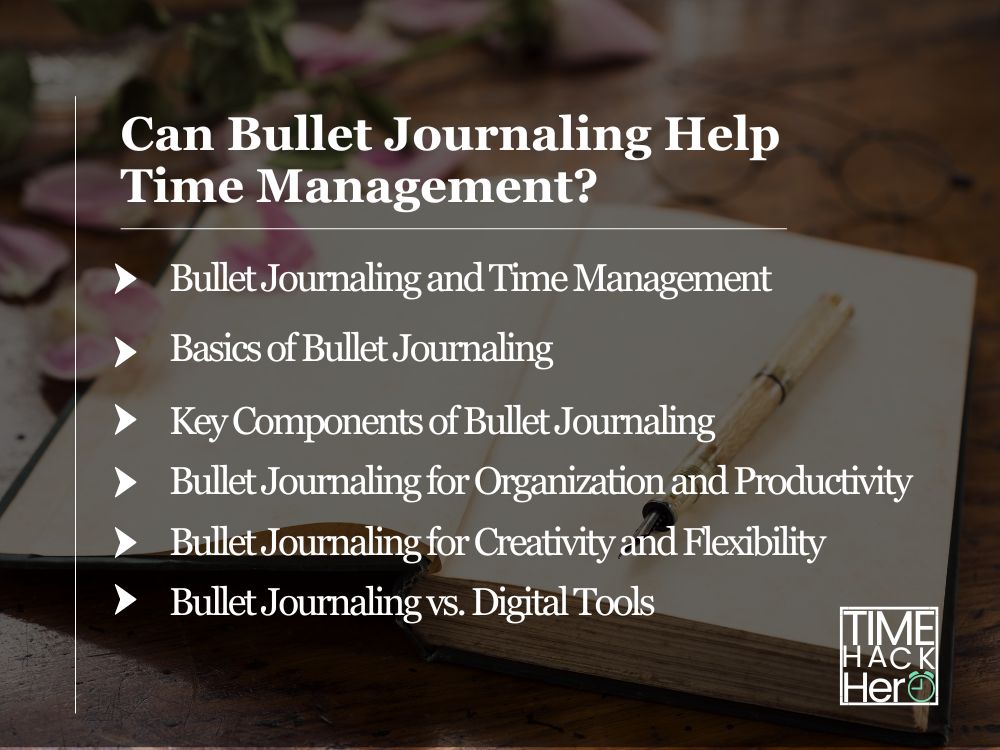In today’s fast-paced world, effective time management is crucial for success in both our professional and personal lives. One popular tool that has gained significant attention for its potential to improve time management and productivity is the bullet journal. Often referred to as an “analogue time management system for the digital age,” the bullet journal is designed to track the past, organize the present, and plan for the future.
Created by New York-based designer Ryder Carroll, the bullet journal is a combination of a daily planner, to-do list, and diary. Its flexible structure encourages users to customize their journal to best suit their individual needs and preferences, allowing for a personalized approach to time management. Proponents of the bullet journal argue that it not only offers a practical solution for organizing tasks and events but also provides a creative outlet for personal reflection and growth.
However, some skeptics question the overall efficacy of the bullet journal, citing its potential complexity and the need for a high level of discipline and commitment to maintain it consistently. As the debate continues, it’s essential to critically examine the bullet journal’s impact on time management and determine whether it lives up to its reputation of being a game-changer in the way we approach efficiency and balance in our daily lives.
Table of Contents
Bullet Journaling and Time Management
Importance of Time Management
Effective time management is crucial for success in various aspects of life. It helps maintain a healthy work-life balance, achieve personal goals, and reduce stress. By managing time wisely, you enhance productivity, improve decision-making, and increase the overall quality of your life.
Bullet Journaling as a Time Management System
Bullet Journaling, also known as BuJo, was created by New York-based designer Ryder Carroll. This method is an “analogue time management system for the digital age” that fosters proper organization and planning. It serves as a daily planner, to-do list, and diary, all in a single notebook.
The flexibility of a bullet journal allows users to adapt it to their specific needs and preferences. By using symbols, quick notes, and customizable sections, bullet journaling promotes clarity, focus, and efficiency.
Bullet Journal for Task Management
- A task: A small bullet or dot signifies a task.
o An event or appointment: An open dot signifies an event or appointment.
x Completed tasks: An X signifies a completed task.
In bullet journaling, tasks can be migrated from one day to the next, ensuring that they are not forgotten. This practice aids in prioritizing tasks and maintaining focus on important objectives.
Bullet Journal for Planning and Goal Setting
A bullet journal can serve as a valuable planning tool for setting short-term, long-term, and even daily goals. It can be customized to track progress, identify obstacles, and gauge achievements.
By regularly reviewing and updating the bullet journal, users can reassess their priorities, adjust their goals, and develop time management skills needed for personal and professional growth.
In conclusion, bullet journaling is a versatile and adaptable time management method that has proven to be effective for many individuals. By incorporating this analog system into your daily routine, you may find improvements in your time management skills, overall productivity, and progress towards your goals.
Basics of Bullet Journaling
Tasks and Events
Bullet Journaling is a system that combines a daily planner, to-do list, and diary. It is designed to help you track your tasks, events, and goals, making it an excellent time management tool. Tasks are represented by bullet points, while events are depicted by circles. When a task is complete, you can cross it off or mark it as done, allowing you to see your progress throughout the day.
Index
The index is a crucial component of a bullet journal, allowing you to quickly find the content you’re looking for. At the beginning of your journal, create an index page by listing all the sections and their corresponding page numbers. As you add more content, update the index so you can easily locate information when needed.
Logs
Logs are records of events, tasks, and notes that you want to keep track of in your bullet journal. There are three main types of logs: daily, monthly, and future logs.
- Daily Log: This log is your day-to-day record of tasks, events, and notes. Use a new page for each day and list your activities, marking them as tasks or events. Use checkboxes to mark tasks as complete and update the log with notes or reflections throughout the day.
- Monthly Log: A monthly log is a summary of your activities and goals for the entire month. At the beginning of each month, create a two-page spread: one page for the calendar and one for your task list. Use this log to track and plan events, appointments, and personal objectives.
- Future Log: The future log is used to keep track of events and tasks that are scheduled in the coming months or are too far in the future. Divide your page into sections for each future month, then list events and tasks associated with those months. Over time, you can move over future log content to your daily and monthly logs as you approach that time.
With these sections in mind, creating and maintaining a bullet journal can greatly aid in managing your time and staying organized.
Key Components of Bullet Journaling
Bullet Journaling is an effective analog system for managing tasks, setting goals, and organizing your life. The system, often referred to as “BuJo,” has two main components: Symbols & Migration and Modules & Collections. In this section, we will explore these key components, which can help enhance time management when using a Bullet Journal.
Symbols and Migration
Symbols play a crucial role in Bullet Journaling, as they help in categorizing and prioritizing tasks. The system uses various symbols, such as:
- Dots for tasks
- Circles for events
- Dashes for notes
Moreover, signifiers like an asterisk, exclamation point, or eye symbol can be leveraged to give tasks additional context or indicate urgency.
Migration is another essential aspect of Bullet Journaling. It is the process of moving incomplete tasks to a new day or month. Ideally, migration should be done monthly, allowing users to assess their tasks’ progress and revise their focus. This process also encourages users to prioritize tasks and eliminate those that are no longer relevant.
Modules and Collections
Modules in a Bullet Journal are the organizational structure that keeps tasks, events, and notes organized. The system usually consists of the following core modules:
- Index: An organized table of contents, guiding you to different sections of your journal.
- Future Log: A high-level, long-term overview of the months ahead, perfect for tracking important events and appointments.
- Monthly Log: A monthly calendar that provides a more detailed view of the month, listing tasks and priorities.
- Daily Log: A day-to-day breakdown of tasks, events, and notes, offering a deep level of organization.
Collections are thematically organized lists or groupings of tasks or notes that share a common topic or goal, separate from the core modules mentioned above. Examples of collections could be:
- Books to read
- Personal goals
- Travel plans
- Shopping lists
An essential part of Bullet Journaling’s time management aspect is the ability to create collections specific to your personal or professional needs, ensuring a tailored approach to organizing your life.
In conclusion, Bullet Journaling is a flexible and customizable approach to time management that can help individuals stay organized, prioritize tasks, and achieve goals. Its core components, symbols & migration, along with modules & collections, provide users with a comprehensive organizational system adaptable to their unique needs.
Bullet Journaling for Organization and Productivity
Bullet journaling is a versatile and customizable organizational system that can help improve time management. By blending elements of planning, scheduling, and tracking, you can stay focused on what’s important while maximizing efficiency.
Planning and Scheduling
Bullet journaling allows you to create your own unique planner by utilizing a combination of calendars, to-do lists, and notes. This approach accommodates various styles of planning and can be adjusted to fit your specific needs.
- Calendars: You can create monthly, weekly, or daily calendars for an overview of your schedule. This can help you visualize upcoming tasks, events, and deadlines.
- To-do lists: Curate lists of tasks you need to complete, categorizing them by importance, urgency, or other factors to prioritize your workload.
- Notes: Dedicate space in your bullet journal to jot down ideas, reflections, or additional information. This can help you capture thoughts and concepts that can further support your planning process.
Tracking and Time Blocking
In addition to planning and scheduling, bullet journaling allows you to track various aspects of your life and use time blocking techniques to enhance productivity.
- Trackers: These can be used to monitor progress, habits, or other areas of interest (e.g., exercise, budgeting, self-care). By consistently recording data in your bullet journal, you can easily analyze patterns and make informed decisions.
- Time blocking: Assigning specific time slots to tasks can help you avoid multitasking and focus on one task at a time. This method also promotes the efficient use of your finite resource – time. Time blocking can be useful for prioritizing important tasks or allocating set periods for meetings, personal projects, and relaxation.
Bullet journaling can serve as a powerful alternative to digital tools and apps for managing time. Its analog nature encourages mindfulness and can help combat procrastination. As a productivity tool, a bullet journal offers a flexible and adaptable organizational system that fosters focus and efficiency, ultimately helping you make the most of your time.
Bullet Journaling for Creativity and Flexibility
Therapeutic Aspects of Bullet Journaling
Bullet journaling, also known as BuJo, is a unique combination of a diary, daily planner, and to-do list. It allows for personal reflection and serves as a mindfulness practice that declutters your mind. Engaging in creative activities like bullet journaling can have a powerful effect on personal growth, change, and understanding the context of your life.
One therapeutic aspect of bullet journaling is its ability to provide clarity in organizing thoughts and experiences. By taking notes and developing lists, users can clarify their experiences and create structures that aid in processing what they have gone through.
Customizable Layout and Designs
A significant advantage of bullet journaling is its flexibility in layout and design. The customizable nature of bullet journaling enables users to tailor their journal to fit their specific needs and preferences. This customization allows for more effective time management and prioritization.
Some popular layout options for bullet journaling include:
- Time tracking: Users can design spreads to track their time spent on different tasks or projects, ensuring efficient use of their time.
- Priority lists: Bullet journals can be used to create priority lists to help users focus on the most important tasks and avoid procrastination.
- Editorial calendar: For content creators, a bullet journal can serve as an editorial calendar to plan and schedule content pieces in advance.
- Weekly schedule: Users can create a spread that outlines their weekly schedule, giving an overview of upcoming events, deadlines, and commitments.
By incorporating these various elements within a bullet journal, individuals can design a system that works best for their time management needs and encourages creativity. The adaptability of bullet journals ensures that they can evolve along with the user’s changing preferences and requirements over time.
Bullet Journaling vs. Digital Tools
Pros and Cons of Bullet Journaling
Bullet journaling is a popular time management system that consists of to-do lists, calendars, and diary entries. It serves as an appealing alternative for people who prefer analog methods. Bullet journaling offers several advantages:
- Personalization: The bullet journals are fully customizable, enabling users to choose layouts and designs that cater to their individual preferences.
- Focus: Handwritten journaling can help increase concentration and mindfulness while reducing screen time.
- Creativity: Encouraging artistic expressions, bullet journals often double as sketchbooks, fostering a creative outlet.
However, there are noteworthy drawbacks to consider:
- Time-consuming setup: Building and maintaining a bullet journal can be time-consuming, especially for those with intricate designs.
- Inconvenience: Bullet journals can be cumbersome to carry around compared to digital tools, which are accessible on smartphones and other devices.
- Risk of damage or loss: Physical journals are susceptible to damage or loss, which could result in losing important tasks and information.
Benefits of Combining Traditional and Digital Techniques
Integrating analog bullet journaling with digital tools can lead to an optimized time management experience. Below are some ways in which these techniques can be combined:
- Accessibility: Apps like Evernote allow digitally replicating bullet journals, ensuring easier access and content backup.
- Reminders: Digital tools can be used to set alerts and reminders for important tasks, while analog journaling helps maintain focus during execution.
- Synchronization: Combine calendar apps and email with a bullet journal to create a centralized system while retaining the hands-on nature of bullet journaling.
Accomplishing a harmonious blend of traditional bullet journals and digital tools allows users to reap the benefits of both systems while maintaining a balance between focus and convenience. By incorporating these techniques, one can create a time management strategy suited to their needs and preferences.









